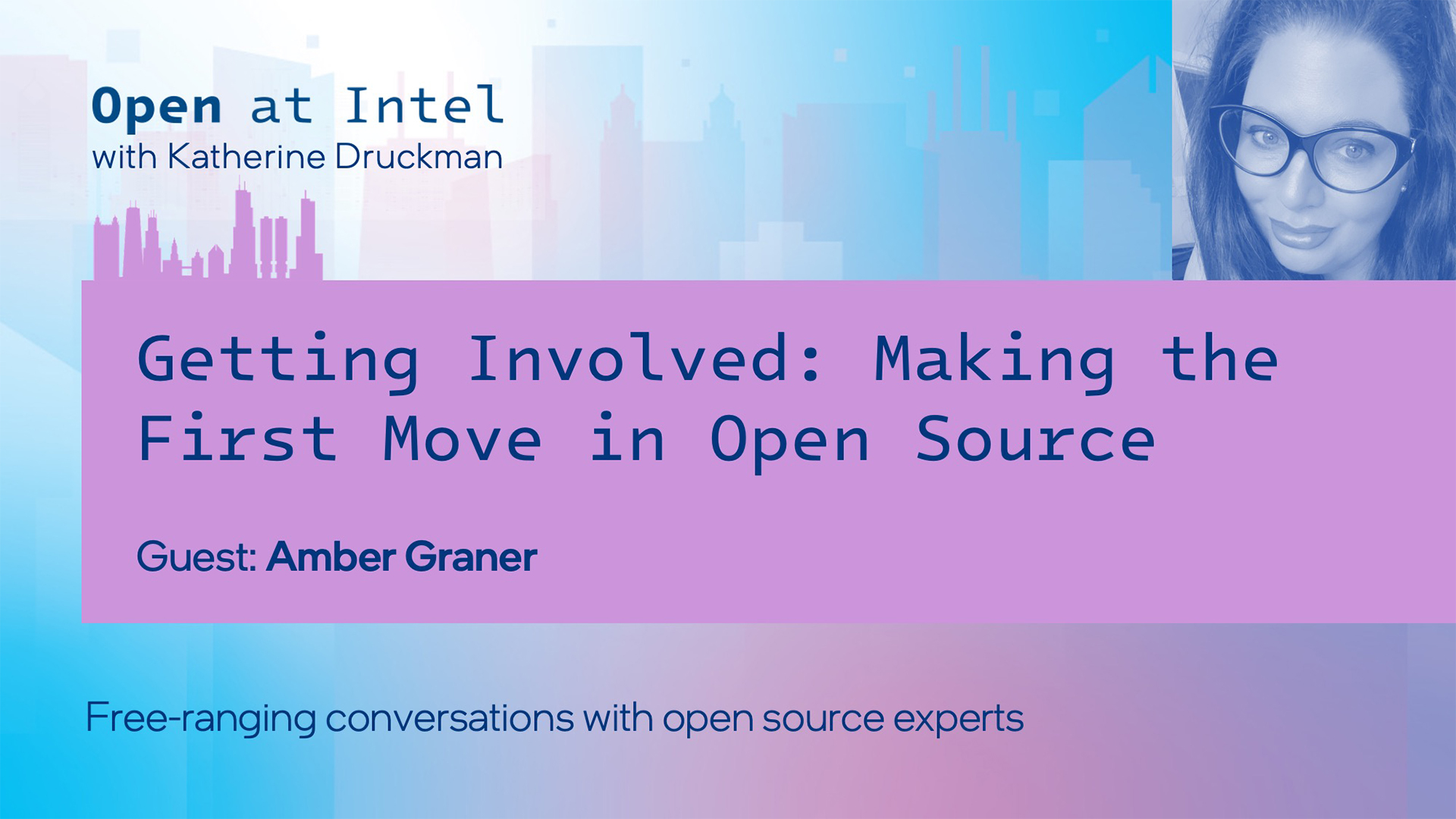We all know open source runs on collaboration, but sometimes fear of failure and imposter syndrome hold us back. As the open source world expands, Amber Graner has a simple practice to help newcomers learn the ropes: Frequently share what you’re learning. Even if you think the lesson is one you should have learned years ago, chances are someone can benefit from hearing about it.
In this interview, Graner shares insights on creating welcoming spaces, finding your passion, and getting involved in open source. Listen to the full Open at Intel podcast episode here. This conversation has been edited and condensed for brevity and clarity.
Katherine Druckman: You and I were both involved in the open source publishing world. When we met at OSCON in 2009, I was working for Linux Journal and you were writing for Linux New Media. There were very few women at the time. I joke that there were five of us back then, so we all knew each other.
Amber Graner: There was a study done about that time. It said 2 percent of the open source world were women in 2009 or 2010. Very low.
Katherine Druckman: The percentage was a little higher for software in general—maybe 15 or 20 percent, but open source was 2 percent. It’s been a while now, and we’ve seen so much change.
Amber Graner: My first taste of open source was when I was still in the army in the early ’90s. I was at Fort Bragg, now Fort Liberty, and the guys from the 82nd got ahold of Slackware and an old Zenith laptop. They wanted to see if they could pass messages to an aircraft in flight. So I got my first taste of open source, but I decided to focus on my family when I got out of the army.
When my kids got older, my husband was a kernel developer for Canonical, and he brought me an old Dell notebook and an Intrepid CD. He told me to use the community to learn because not everybody has a kernel developer sitting in their living room, and within a couple of hours, I was blogging. Linux New Media found me, and I started working with them. Then Pearson picked me up to review the Official Ubuntu Book, and I became a coauthor for two editions. I was determined that in this space there are so many more opportunities than just code. You don’t have to write code to be successful.
Katherine Druckman: It’s so nice to be reminded of that because when I was a web developer, I believed that if it’s not code, it’s not a real contribution.
Amber Graner: Non-code contributions are just as important because people can write code, but without somebody to tell people about it, it just kind of sits there as somebody’s personal project. I correct people about this all the time—“technical” includes code, but is not limited to code.
I want to get back to those stages where people learn something and share something. I know I’m guilty on this point. When I first started in open source and started writing blog posts about it, I would learn something new about software and go share it with the world. But as I progressed in my career, I would say to myself, “I can’t share that because now I’m a director. What will people think?” Where did my sense of adventure and curiosity go? I needed to remind myself that nobody’s born with this information. We all learn at different rates and have different styles. Those of us who have been in this space for a long time need to get back to reminding people that we learn every day too.
The inclusivity that has happened over the last 13 or 14 years has been incredible, but we still have a ways to go. In some projects, that thought leadership is left behind because they’re forcing nondevelopers to use developer tools. If GitHub isn’t in your workflow, and you’ve got to use it to submit an article, you might have a great technical writer who doesn’t know how to do a pull request, so you’re missing the opportunity for this talent to participate. Make sure there’s somebody there to help.
Passing the Torch
Katherine Druckman: What about the next generation—are they excited about open source and invested in the ideology, or are they just interested in getting a job?
Amber Graner: When I got started, there was an us-against-them mentality. It was almost a David and Goliath story, where open source needed to win against proprietary. Now there’s a hybrid approach to all this. Open source has won—we’re everywhere. I don’t think there’s a tool on the machine learning and AI side that doesn’t have a component of open source in it, whether it’s a proprietary solution or not.
Katherine Druckman: As high as 90 percent of all software contains open source components.
Amber Graner: I think it gets taken for granted that open source is just there. It’s up to us to generate that excitement and pass the torch about why these principles and philosophies are important because a lot of young people are getting introduced to open source because it’s their job, not because they’re passionate about it.
I gave a talk called You Don’t Need Permission to Contribute to Your Own Destiny. So many people, especially around open source, wait to be invited. They get a taste of open source, but they’re not sure how to contribute. You don’t have to wait on an invitation. Pick your project and just jump in—get in the community, join a meeting, lurk around and listen for a while, read the documentation, and when you’re ready, get involved.

Creating Inviting, Collaborative Spaces
Katherine Druckman: Mentorship is important in making open source sustainable. We know that as people find their way, they get hooked on the collaboration and keep coming back for more.
Amber Graner: I think there’s something interesting about being part of something bigger than yourself. People seek out the feeling of belonging to a community, and open source has given that to a lot of people. Once you have one success, it’s easy to build on it. As humans, we all live for those successes. Each success builds on the last. Also, I think it was in the first edition of The Open Source Way that Karsten Wade said, “If you fail, take notes.” Sharing the failures is just as important as sharing the successes.
As you go forward in your career, you forget those failures, or you don’t want to share them because now you might be seen as an expert in this space, or imposter syndrome creeps in. No matter what level of your career you’re in, it’s important to remember where you came from. Don’t forget your roots. And don’t forget to bring people along. The only time you should look down at somebody is if you’re reaching down to help them up.
Katherine Druckman: We’re all human. We’re just doing the work, putting in the time, and getting better as we go.
Amber Graner: When I went to that first OSCON way back when in 2009, folks would tease me and say, “Amber, you didn’t go into the wading pool, you just jumped into the Olympic pool.” Everybody was so encouraging, and nobody said, “Amber, this is your first time contributing.” Instead, they said, “What did you notice? What are you seeing? You’re this new face; how can we make it easier for you?” I hope that new people who come to any open source event never feel lost. I want everyone to have the experience I did of writing their own adventure.
And I want organizations that are building solutions on top of open source projects to remember that there’s trust involved. Project founders release software with the license that’s permissible to use the project and make it better, and they’re trusting the community to give back. Transparency and trust are very important in this space. Don’t exploit the projects that you’re building your enterprise-level solutions on. If you’re making a request of a project, you should be involved in the project. You shouldn’t just make drive-by requests or demands and not offer any help.
Katherine Druckman: There’s a social contract involved in open source, and we’re all expected to uphold our end.
Amber Graner: Good projects have the grand essentials—something to love, something to hope for, and something to do. People may believe the project is going to create a better future, but if you’re part of a community, you need something to do. If you’re just sitting there with skills nobody’s using, you’re not going to stick around. That’s why it’s important to have that list of things the community can do and ways to get involved. There’s a whole group of people out there who have amazing skills, and if one project isn’t going to utilize them, there’s another that will.
A New Chapter
Katherine Druckman: What are you doing now?
Amber Graner: I’m active in the Kubeflow community, which makes it easier to do your ML workflows natively in Kubernetes. We recently became members of the Cloud Native Computing Foundation (CNCF). We’re in incubation, working toward graduation now.
What I’m most passionate about is making sure that people know their voice, time, and talent are important. There’s a place for you and your skills, and just because you don’t write code doesn’t mean you’re not equally important to a project. Right now, my passion is thought leadership—mentoring new leaders, having hard discussions around inclusion and the language we use around accessibility, and really making sure this space is as inclusive as we want it to be.
We need to make sure that people are good citizens in this space. Some people don’t want to hear, “Hey, you’re being exploitative. Come up with a road map to give back, or you’re part of the problem.” But the success of open source depends on trust. If you break that trust, you break down how this ecosystem works. So I want to make sure that these principles and philosophies live on and that everybody knows they can participate. I just love helping grow this space.
Katherine Druckman: Thank you for sharing your story.
Amber Graner: It’s just been this incredible journey, and that’s what I want to tell people: No matter where you start, that doesn’t have to be where you stay. Because I went from operating system software to embedded hardware to data center hardware and software to cybersecurity software, and now I’m on the ML and AI side of things. So it’s whatever you have a passion for. Just jump in.
To hear more of this conversation and others, subscribe to the Open at Intel podcast:
- openatintel.podbean.com
- Google Podcasts
- Apple Podcasts
- Spotify
- Amazon Music
- Your favorite podcast player (RSS)
About the Author
Katherine Druckman, Open Source Evangelist, Intel
Katherine Druckman, an Intel open source evangelist, hosts the podcasts Open at Intel, Reality 2.0, and FLOSS Weekly. A security and privacy advocate, software engineer, and former digital director of Linux Journal, she’s a longtime champion of open source and open standards.
Amber Graner, Open Source Evangelist, HPE
Amber Graner’s personal open source journey started in 2009 when she started blogging about Ubuntu. Since then she’s written for Ubuntu User Magazine, coauthored The Official Ubuntu Book (6th and 7th editions), and served as a technical reviewer for Jono Bacon’s Art of Community. Currently, Amber is the open source evangelist and community manager at HPE for the Ezmeral software products.
Amber actively mentors new leaders in open source on how to build their community or project of interest and encourages everyone around her to participate, support, and learn about Kubeflow and open source software and hardware.
